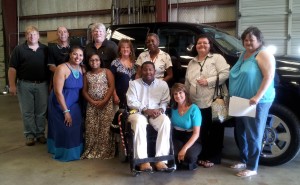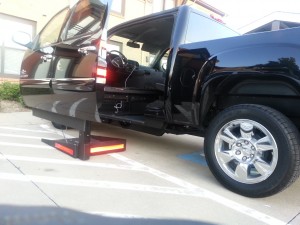
In 1995, 16-year-old Franklin McMurrian had dreams of becoming a sports star — the NBA or NFL, it really didn’t matter. Achievable, perhaps, but for Franklin it suddenly became impossible.
“A friend and me were horsing around with a gun,” McMurrian recalls of the incident that changed his life. It turned out the gun was loaded, and his friend accidently pulled the trigger. “I was on the floor, and I just remember not being able to get up.” The bullet went through McMurrian’s neck, paralyzing him from the chest down.
He went on to high school, graduate from college, become a database production analyst, get married and have four kids. Yet having achieved all that, despite the odds, he never felt independent. Everywhere he went, someone else had to drive. A new dream had replaced his visions of being a professional athlete: the dream of independence, of not having to rely on others to take him places. This summer, with the help of the Texas A&M Transportation Institute (TTI), that dream finally came true.
After getting connected with United Access of Dallas (a provider of wheelchair accessible vehicles and vehicle modification equipment) and the Texas Department of Assistive and Rehabilitative Services (DARS), which helped him pay for a modified truck of his own, McMurrian’s quest for independence began to become reality.

“For years, TTI has quietly worked behind the scenes on this project that’s become one of the most rewarding things I do for the Institute,” Lance Bullard, head of TTI’s Roadside Safety and Physical Security Division, says. “TTI makes sure the equipment meets the DARS standards. We inspect these modified vehicles and the equipment and make sure everything is safe.”
Bullard, Associate Research Specialist John Holmgreen and Research Technician Eric Bradley worked with McMurrian this summer to make sure the truck, the special equipment, and McMurrian were all a good fit.
“TTI made sure everything was right and that I was safe on the road,” McMurrian said. “It’s clear they know what they are doing, and they made the entire process pleasurable.”
“There are a lot of arguments these days about what taxpayers should be spending money on, but in these cases, these are taxpayers, and they simply want to get back to work,” explains General Manager Ryan McClaskey of United Access of Dallas.
His marketing manager, Laura Klaus, agrees: “DARS and TTI provide freedom and independence, allowing folks to do everyday things. A lot of our clients drive off in tears. But they are happy tears.”
McMurrian was no exception.
“After getting into my truck for the first time and driving home, I remember thinking, ‘I’m free.’” When McMurrian got home, he went inside, looked out the window at his truck, and began to cry.
From his home in Richardson to his job in Irving, it’s a 25.3 mile trip one way.
“I wake up in the morning, excited about going to work, excited about living. And if there’s a lot of traffic, that’s fine,” McMurrian says. “It’s no problem for me. I like to take my time.”